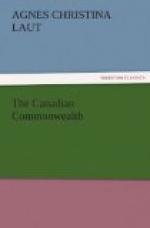I did not learn the story till I had come on down to civilization and town again. That Cambridge man had come out from England flush with the zeal of the saint to work among the Indians. In the Indian school where he taught he had met his Fate—the thing he probably scouted—that fragile type of Indian beauty almost fawn-like in its elusiveness, pure spirit from the very prosaic fact that the seeds of mortal disease are already snapping the ties to life. It is a type you never see near the fur posts. You have to go to the far outer encampments, where white vices have not polluted the very air. He fell in love. What was he to do? If he left her to her fate, she would go back to the inclement roughness of tepee life mated to some Indian hunter, or fall victim to the brutal admiration of some of those white sots who ever seek hiding in the very wilderness. He married her and had of course to resign his position as teacher in the school. He took a position with the company and lived no doubt in such happiness as only such a spiritual nature could know; but the seeds of the disease which gave her such unearthly beauty ripened. She died. What was to become of the children? If he sent them back to England, they would be wretched and their presence would be misunderstood. If he left them with her relatives, they would grow up Indians. If he kept them he must have a mother for them, so he married another trader’s daughter—the little half-breed girl—and chained himself to his rock of Fate as fast as ever martyr was bound in Grecian myth; and there he lives to-day. The mail comes in only once in three months in summer; only once in six in winter. He is the only white man on a watery island two hundred miles from anywhere except when the lumbermen come to the Ridge, or the Indian agent arrives with the treaty money once a year.
And “the last chapter of the fur romance has been written”?
“The last chapter of the fur romance” will not have been written as long as frost and muskeg provide a habitat for furtive game, and strong men set forth to traverse lone places with no defense but their own valiant spirit.
The other example is of a man known to every fur buyer of St. Louis and Chicago and St. Paul—Mr. Hall, the chief commissioner of furs for the Hudson’s Bay Company. I wish I could give it in Mr. Hall’s own words—in the slow quiet recital of the man who has spent his life amid the great silent verities, up next to primordial facts, not theorizing and professionalizing and discretionizing and generally darkening counsel by words without knowledge. He was a youth somewhere around his early twenties, and he was serving the company at Stuart Lake in British Columbia—a sort of American Trossachs on a colossal scale. He had been sent eastward with a party to bring some furs across from MacLeod Lake in the most heavily wooded mountains. It was mid-winter. Fort MacLeod was short of provisions. On their way back travel proved very heavy and slow. Snow buried the beaten trail, and travel off it plunged men and horses through snow crust into a criss-cross tangle of underbrush and windfall. The party ran out of food. It was thought if Hall, the youngest and lightest, could push ahead on snowshoes to Stuart Lake, he could bring out a rescue party with food.




